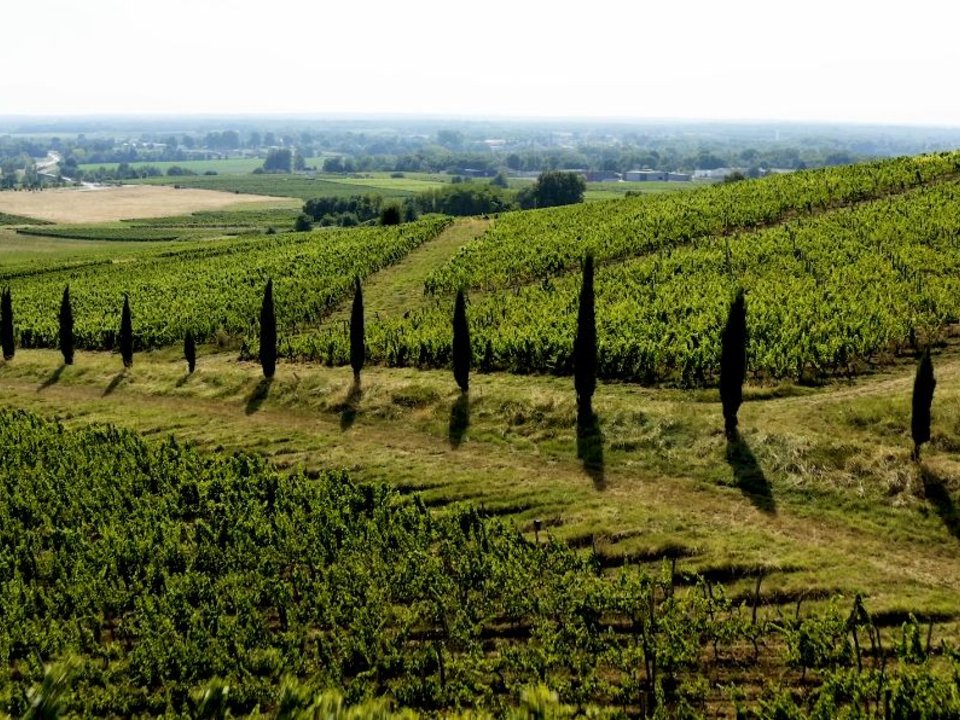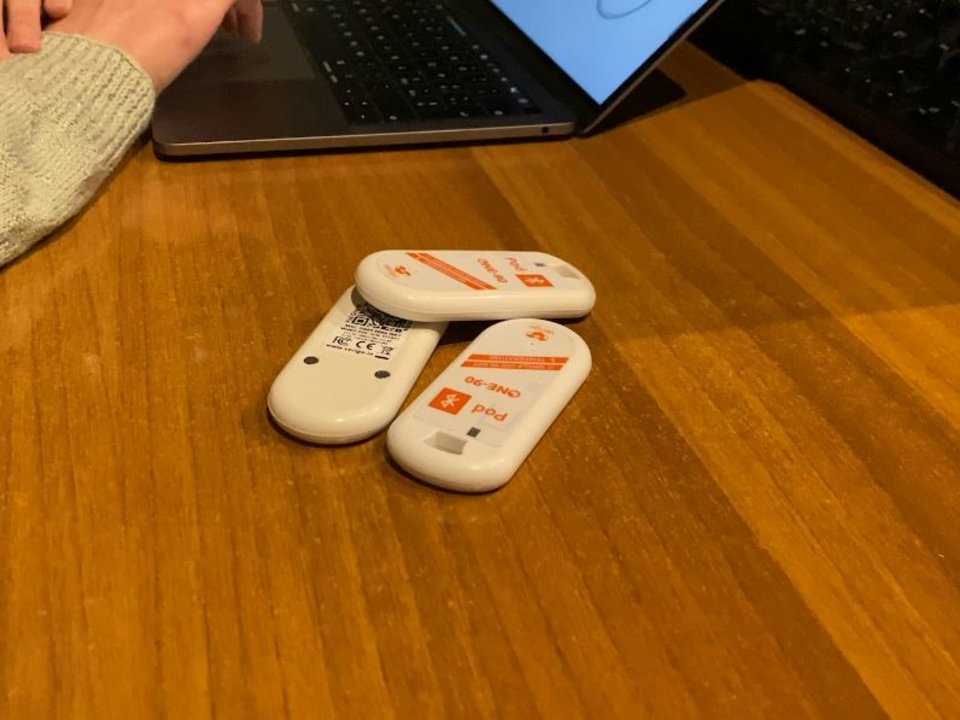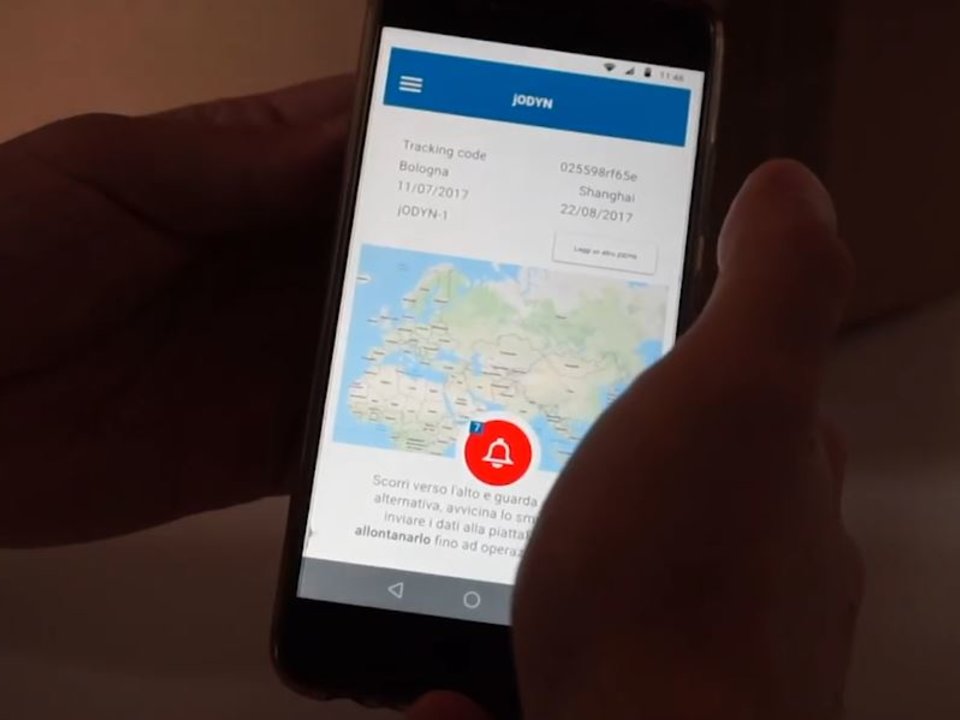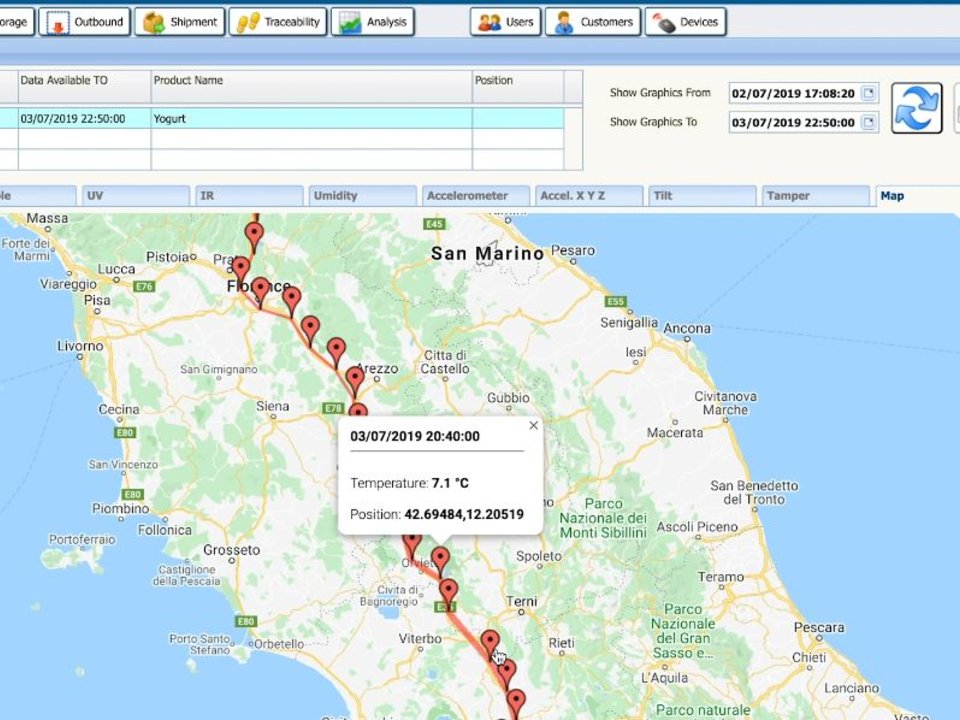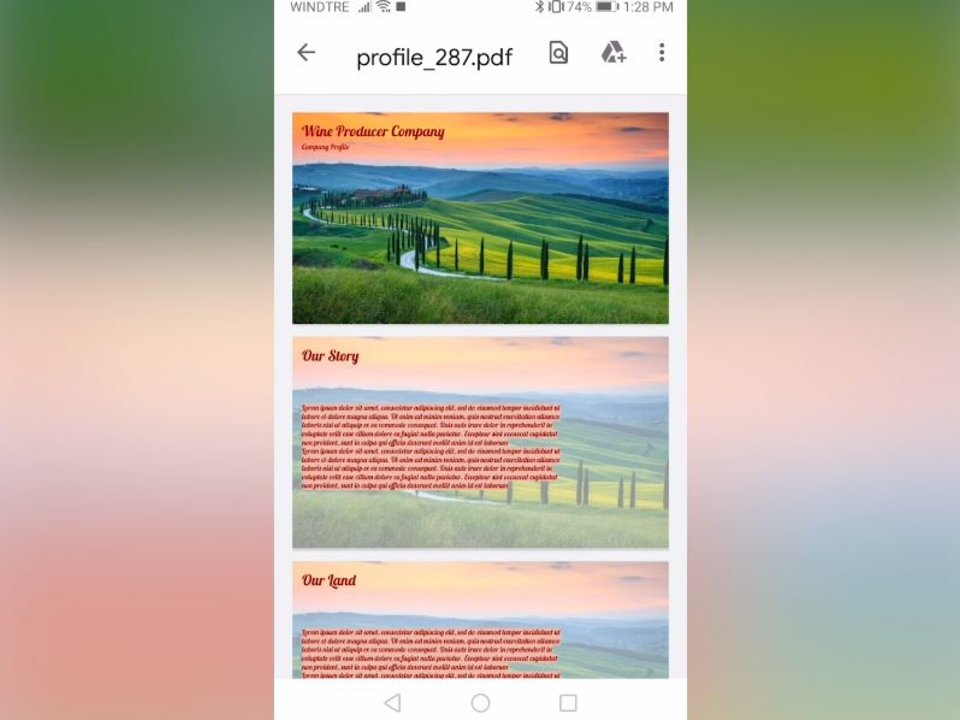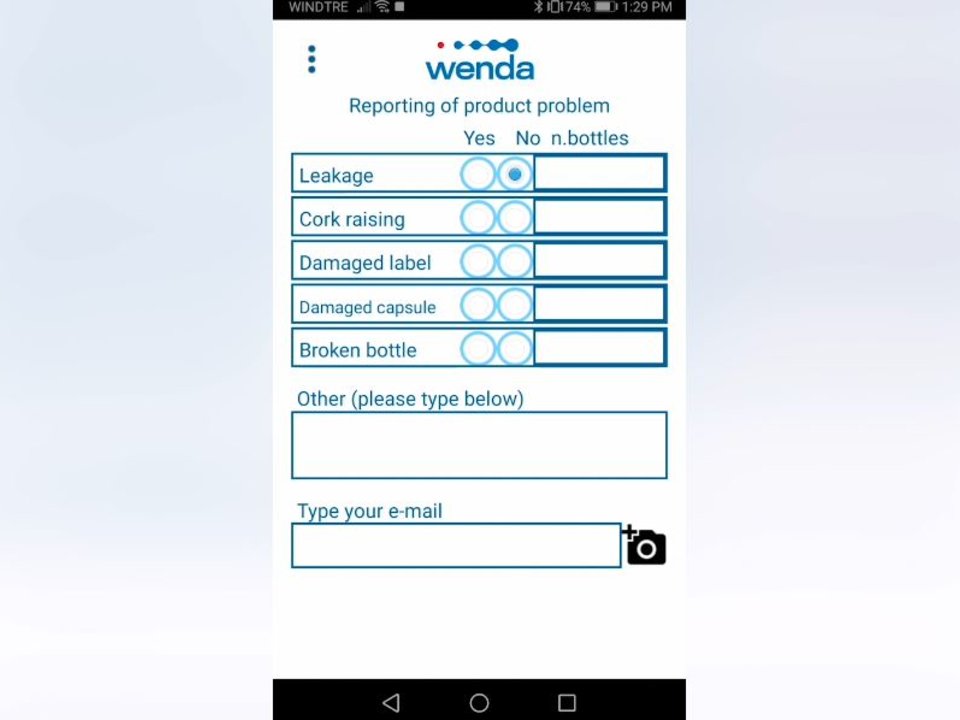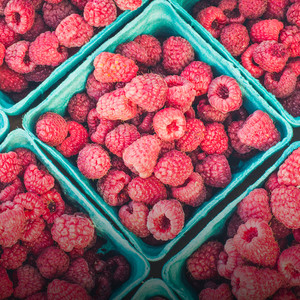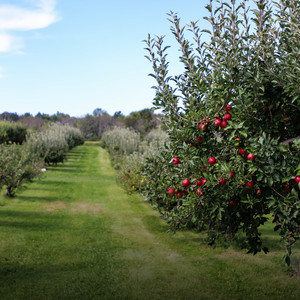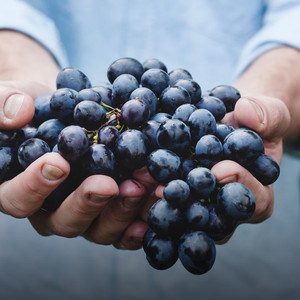Introduction
The journey from producer to consumer is a process that can negatively affect the quality of beverages. In response to this risk, this use case provides insights into the distribution process for all actors involved. To this end, they have created an integrated system that monitors the whole wine and beverage distribution channel to prevent damages caused by integrity-related issues during shipping and storage, establish a direct relationship between producers and retailers, create a large database to plan safe shipments thereby allowing new and customised IoT-based insurance policies. This is achieved through a software as a service system which tracks beverage integrity during distribution by monitoring stress factors (temperature, humidity, and others) and assessing quality by analytics. All of this is made possible by a platform that analyses and displays the information recorded during the journey by smart data loggers placed in a box, in order to validate the integrity of beverage logistics. Discovering the origin of one’s wine while consuming it from the comfort of your own home? This use case makes it possible. But let us not put the cart before the horse as there is much more to it than that.
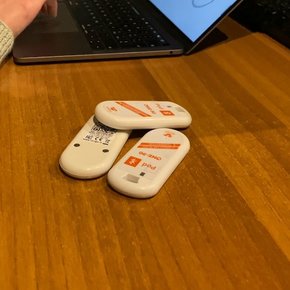
The tasks at hand
One thing was clear from initial experiments carried out by our use case Big Wine Optimisation: 30% of the wines showed significant modification of their composition after 2 weeks in a climatic chamber of 30°C. The effect grows exponentially if the temperature is further increased.
Show more
Only after 6 hours above 35°C, 50% of the examined wines already showed changes in composition and even evident cork raising. An important observation that confirms the necessity to closely monitor those parameters in order to confirm the integrity of delicate products like food or beverages. Hence, from the very beginning, Mattia Nanetti, the Use Case Coordinator, and his team involved stakeholders from the entire supply chain: producers, carriers, distributors, retailers, insurance companies. It helped to discuss and identify practical issues affecting the aim to validate the integrity of logistics. When dealing with all actors of a supply chain, considering the requirements of each of them and subsequently trying to implement it in the service offering, is a crucial factor determining success.
The purpose is to collect large amounts of data on temperature during shipment, frequency of shock causing bottle ruptures, incidence of closure leakage, percentage of bottles showing defects like cork taint, label damage, pressure loss and also oxidation. Additionally, information on consumer appreciation, marketing issues and communication efficacy can be made available via the database. This set of data is especially valuable for the wine & beverage sector and is for the first time accessible to several actors of the value chain.
In order to be able to track at parcel level and to reach the wine shops, a Bluetooth device was chosen. Since it is not connected to the internet, the energy consumption is extremely low (it is powered by button). The chosen communication standards and intervals of data gathering is another important feature that allows the device to travel with the goods for months, ensuring constant tracking. The data-processing is handled directly through an embedded firmware microprocessor which gives the user immediate insights via without having to download all the information from the cloud first. In these regards, the application acts as a bridge between the device and the cloud platform.
Wenda, the partners in this use case, already had an existing cloud platform that collects, stores, processes and displays data for decision-making on dashboards. To tailor the web app to the needs of all actors involved, the interface should not only be as user-friendly as possible, it also offers specific functions for each user category (e.g. producer, importer, wine reseller etc.). Moreover, application programming interfaces (APIs) were implemented to facilitate third party integration in terms of data collection, software or IoT devices. This further enables the platform to be linked to other systems which might already be in place. The corresponding mobile app, used by operators, is first and foremost a tool which seamlessly visualises the recorded beverage journey and acts as a proof of delivery at the good’s destination. Ultimately, it also provides relevant information to support marketing at the retailer level. This way the customers can indeed discover the origins of a wine while consuming it from the comfort of their own home.
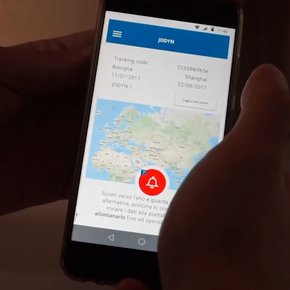
Promoting innovation uptake
Full supply chain visibility strengthens the connection between stakeholders in said chain. Especially the gap between wine producers and retailers such as wine shops is closed which previously was the responsibility of the importers.
Show more
The updated version of the mobile app gives beverage shops the chance to retrieve detailed information about the product they are selling. Even though the beverage industry is a high-value one, it is not yet penetrated by digitalisation or supply chain innovations. Historically, the winemakers have their focus on the fields and only recently discovered that traceability once the product leaves their hands can bring about a competitive advantage. Hence, creating awareness about the benefits this use case’s technology offers was an important aspect in the uptake of IoT innovation in the market. Against this background, the consortium of companies and stakeholders in the entire beverage industry, created at the beginning of the project, came in very handy once more. By leveraging their extended networks, the use case team could reach different regions in Europe and beyond to strengthen the knowledge and fully exploit the potential IoT technologies have to offer to supply chains. However, a single platform is required to bring the actors together and cater to the requirements of track & trace data management.
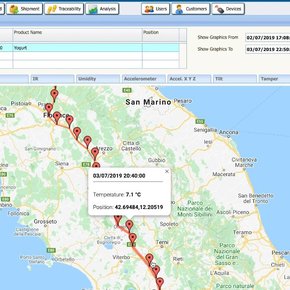
Overcoming market challenges
The beverage market is an open playing field when it comes to cross-actor data analytics. It is not yet penetrated by integrity monitoring systems like other supply chains are.
Show more
This is due to the fragmented structure and complexity of the beverage chain. For the team this means a great opportunity in a previously untapped market with large volumes and high values. The other side of the coin is that it entails uncertainty, making being part a research project like IoF2020 even more important.
More than 20 producers have already used the technology during the research period and more are to come in supply chains of other products such as olive oil, organic or “natural” wines as well as craft and industrial beers. Even during the Covid-19 pandemic the use case managed to maintain their distribution network in 11 countries and 21 regions. The participating producers also vary in terms of enterprise size and type of organisation ranging from regional cooperatives to international groups. This proves the adaptability and robustness of this use case’s technology in other industries. What showcases its interoperability with existing systems is the close collaboration with our use case Intelligent Fruit Logistics. The team of eager researchers did, however, not stop there. Currently they are working on the introduction of FIWARE data models to foster standardisation along with the reusability of components in the future as it prevents any proprietary lock-in.

Get in touch with the use case team via the SmartAgriHubs Innovation Portal
Go to portalAchievements, products & services
Single platform to increase the beverage supply-chain visibility and connect producers with retailers
Blockchain environment for users to certify the data for legal use
General database with data from all participants on wine shipping open through license to allow insurance companies to propose IoT-based insurance policies
Optimised deliveries due to gained knowledge concerning transportation conditions to improve future deliveries
Cost reduction and monitoring of the beverages quality of wine and beverage during transport
